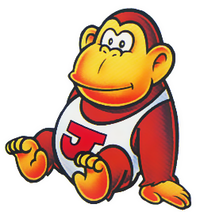Donkey Kong Jr.: Difference between revisions
Greenmist158 (talk | contribs) (→Trivia) |
m (irrelevant) |
||
| Line 243: | Line 243: | ||
*The game files for ''[[Super Smash Bros. Brawl]]'' reveal that Donkey Kong Jr. was originally meant to be included as a trophy in the game. <ref>[http://tcrf.net/Super_Smash_Bros._Brawl#Unused_Trophies The Cutting Room Floors Wiki: Super Smash Bros. Brawl]; retrieved 6/14/12</ref> | *The game files for ''[[Super Smash Bros. Brawl]]'' reveal that Donkey Kong Jr. was originally meant to be included as a trophy in the game. <ref>[http://tcrf.net/Super_Smash_Bros._Brawl#Unused_Trophies The Cutting Room Floors Wiki: Super Smash Bros. Brawl]; retrieved 6/14/12</ref> | ||
*Despite being Donkey Kong's son, after his NES games and remakes (''Donkey Kong'' for the Game Boy included), he has only appeared in Mario and Wario games. | *Despite being Donkey Kong's son, after his NES games and remakes (''Donkey Kong'' for the Game Boy included), he has only appeared in Mario and Wario games. | ||
==References== | ==References== | ||
Revision as of 22:32, May 18, 2013
Template:Articleabout Template:Character-infobox
- “Monkey Muscle!”
- —Donkey Kong Jr., Saturday Supercade
Donkey Kong Jr. (sometimes referred to as DK Jr. or just Junior) is the son of the original Donkey Kong. He first debuted in Donkey Kong Jr., an arcade game first released in 1982. He has yet to make any playable appearances since Mario Tennis.
Diddy Kong of the Donkey Kong series was first intended to be a redesign of Donkey Kong Jr., but Nintendo didn't like the extreme changes Rare, Ltd. was making to the character, and ordered that the Donkey Kong Country sidekick be made into a completely new character.[1]
History
Donkey Kong series
Donkey Kong Jr.
Donkey Kong Jr.'s premier appearance is in the eponymous Donkey Kong Jr. He is the star of the game and the only playable character. It follows the events of the original Donkey Kong, where Donkey Kong Jr.'s father, Donkey Kong has now been locked up by Mario. Donkey Kong Jr. must travel through four stages, climbing vines to ascend them and then watching as Mario hauls his father further on through the game.
There are numerous enemies that Donkey Kong Jr. must avoid. However, if he drops fruit on the enemies, they will be defeated. Once Donkey Kong Jr. has put a key into the cage, Mario will move further on. When Donkey Kong Jr. beats Mario at last in Stage 4, Donkey Kong and Mario both fall; Donkey Kong Jr. catches his father and then walks off-screen with his newly-freed papa.
Donkey Kong Jr. Math
One year later, Donkey Kong Jr. made another playable appearance in the game Donkey Kong Jr. Math. His father stood at the top of the stage, holding a sign with a random number placed on it. Donkey Kong Jr. had to climb amongst multiple vines to gather the correct numbers and mathematical signs to create the number on his father's sign.
This game also starred a pink-colored ape that could be playable in a two-player game; however, Donkey Kong Jr. was still brown in color, and could be played as in both one- and two-player modes.
Donkey Kong (Game Boy)
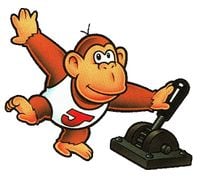
In Donkey Kong on the Game Boy, Donkey Kong Jr. aids his father in kidnapping Pauline, and Mario must defeat both of them before rescuing her. For most of the game, Donkey Kong Jr. usually stays in areas inaccessible by Mario, activating and deactivating levers in ways that can either help or harm Mario. Sometimes, Donkey Kong Jr. even appears out in the open and throws Poison Mushrooms. He kills Mario instantly if he touches him. Finally, Mario got to stop him for good in Stage 9-4, where he locked him in a cage in a fashion similar to Stage 4 of the original Donkey Kong Jr.. In the ending, Donkey Kong Jr. somehow managed to free himself and lay in wait as Pauline gave Mario a Super Mushroom to catch Donkey Kong, and acted as soon as his father was calling for help, although they presumably buried the hatchet.
Saturday Supercade
Donkey Kong Jr., voiced by Frank Welker, is featured as the main protagonist of the cartoon short Donkey Kong Jr. from the animated series Saturday Supercade. Here, Donkey Kong Jr., after discovering his father is missing from the circus, decides to track him down with the help of a clumsy biker named Bones.
Nintendo Adventure Books
Donkey Kong Jr. makes an appearance in the sixth Nintendo Adventure Book, Doors to Doom; in the book, Mario and Luigi find themselves in Donkey Kong Jr.'s jungle after entering one of the doorways created by Dr. Sporis Von Fungenstein. Upon seeing Mario and Luigi, Donkey Kong Jr. attacks them, forcing the two to flee. Eventually, after a vine-climbing chase, the Mario Bros. escape Donkey Kong Jr.
Super Mario Kart
In 1992, Donkey Kong Jr. appeared as a playable character in Super Mario Kart for the Super Nintendo Entertainment System. He was classified as a heavyweight character alongside Bowser. His preferred item was the Banana, with which he would litter the racecourses. His kart had maximum top speeds; however, if he were to drift away from the main course, its speed would decrease greatly. In every Mario Kart title since Mario Kart 64, he has been replaced by the modern Donkey Kong. He also appears as a cameo in the background of Waluigi Stadium in Mario Kart: Double Dash!!
Mario Tennis series
Mario's Tennis
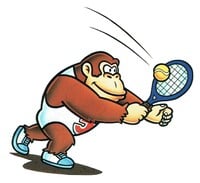
In 1995, Donkey Kong Jr. appeared as a playable character once more – this time in Mario's Tennis. He appeared as the only large character in the game, for Bowser was not playable.
Mario Tennis (Nintendo 64)
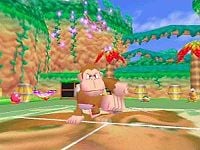
Donkey Kong Jr. made his final playable appearance in 2000, in the Nintendo 64 adaption of Mario Tennis. He was classified as a Power Character, who could be secretly unlocked (alongside Shy Guy). In this game he had an alternate color scheme that made him identical to Pink Donkey Kong Jr..
Game & Watch Gallery series
Donkey Kong Jr. appeared many times in the Game & Watch Gallery installments. Donkey Kong Jr. appears in the first two games with role as a "damsel in distress" in several of the minigames. However, Donkey Kong Jr. is the star of his own mini game which is a small remake of the original Donkey Kong Jr. game. The same minigame from the third game also appears in the fourth installment of the series.
Super Smash Bros. series
Super Smash Bros. Melee
Donkey Kong Jr. also has a trophy in Super Smash Bros. Melee, though he does not make a playable appearance.
Super Smash Bros. Brawl
In Super Smash Bros. Brawl, unlike in Super Smash Bros. Melee, he does not have a trophy. Instead, he has a Sticker. The sticker shows Donkey Kong Jr. with a key over his head; the sticker is only referred to as Junior. It raises launch resistance by twenty-one in the Subspace Emissary adventure mode of the game. His other sticker shows him holding a tennis racket from Mario Tennis. Additionally, one of the names that appears when the player presses the "Random Name" button when naming their custom stage is DKJR, which is his name.
Punch Out!! series
Punch Out!!
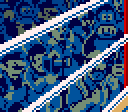
In the first game in the series, Donkey Kong Jr. could be found watching the fight in the audience along with Mario and Luigi.
Super Punch Out!!
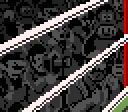
In the second arcade (and second overall) game in the Punch Out!! series, Donkey Kong Jr. could be found in the audience again, along with Mario, Luigi, and Donkey Kong, this time however with a different color scheme.
Game Appearances
| Title | Description | Release Date | System/Format |
|---|---|---|---|
| Donkey Kong Jr. | Playable Character. | 1982 | Nintendo Entertainment System/Arcade |
| Donkey Kong Jr. | Playable Character. | 1982 | Game & Watch |
| Donkey Kong Jr. Math | Playable Character. | 1983 | Nintendo Entertainment System |
| Donkey Kong II | Playable Character. | 1983 | Game & Watch |
| Donkey Kong Jr. + Jr. Math Lesson | Playable Character. | 1983 | Nintendo Entertainment System |
| Punch-Out!! | Cameo as member of crowd. | 1984 | Arcade |
| Super Punch-Out!! | Cameo as member of crowd. | 1985 | Arcade |
| Donkey Kong/Donkey Kong Jr./Mario Bros. | Playable Character in Donkey Kong Jr. | 1985 | Arcade |
| Donkey Kong Classics | Playable Character in port of Donkey Kong Jr. | 1988 | Nintendo Entertainment System |
| Super Mario Kart | Playable Character. | 1992 | Super Nintendo Entertainment System |
| Super Mario All-Stars | Cameo as the transformation of the Giant Land King. | 1993 | Super Nintendo Entertainment System |
| Donkey Kong | Enemy in certain stages. | 1994 | Game Boy |
| Mario's Time Machine | Cameo as a picture hanging in Bowser's Museum. | 1994 | Nintendo Entertainment System |
| Super Mario All-Stars + Super Mario World | Cameo as the transformation of the Giant Land King. | 1994 | Super Nintendo Entertainment System |
| Mario's Tennis | Playable Character. | 1995 | Virtual Boy |
| Game & Watch Gallery | NPC in modern versions of Manhole, Fire and Oil Panic. | 1997 | Game Boy |
| Game & Watch Gallery 2 | NPC is modern version of Parachute. | 1997 | Game Boy |
| Game & Watch Gallery 3 | Playable Character in modern and classic version of Donkey Kong Jr and in a port of Donkey Kong II. | 1999 | Game Boy |
| Mario Tennis | Unlockable Playable Character. | 2000 | Nintendo 64 |
| Mario Tennis | Cameo as N64 Status' Icon (After N64 Link) | 2001 | Game Boy Color |
| Super Smash Bros. Melee | Trophy | 2001 | GameCube |
| Animal Crossing | Playable in unlockable NES version of Donkey Kong Jr. and Donkey Kong Jr. Math. | 2001 | GameCube |
| Game & Watch Gallery 4 | Playable Character in modern and classic versions of Donkey Kong Jr., and NPC in modern versions of Rain Shower and Fire. He also appears on the title screen. | 2002 | Game Boy Advance |
| Super Mario Advance 4: Super Mario Bros. 3 | Cameo as the transformation of the Giant Land King. | 2003 | Game Boy Advance |
| Mario Kart: Double Dash!! | Cameo as an audience member in Waluigi Stadium. | 2003 | GameCube |
| WarioWare: Twisted! | Cameo in microgame. | 2004 | Game Boy Advance |
| Super Smash Bros. Brawl | Cameo as Sticker. | 2008 | Wii |
| Super Mario All-Stars Limited Edition | Cameo as the transformation of the Giant Land King. | 2010 | Wii |
Trophy Information from Super Smash Bros. Melee
| Name | Image | Game | Description |
|---|---|---|---|
| Donkey Kong Junior | File:Trophy276.PNG | Donkey Kong Junior Arcade 1982 |
Donkey Kong Jr. came to the rescue when Mario imprisoned his father. DK Jr.'s challenge was to collect the keys to Donkey Kong's cage, all the while dropping fruit on his enemies from high above. He was able to climb faster by using two ivy vines at once. This ape is also quite skilled as kart racing, tennis, and mathematics. |
Gallery
Trivia
- Oddly, several games in which Donkey Kong Jr. cameos contain doppelgängers implying that Donkey Kong Jr. may actually be a species rather than a character. Such examples of these games include Game & Watch Gallery, and Donkey Kong Jr. Math which includes a second Donkey Kong Jr. recolored pink. One of the Mushroom Kings in the 16-bit remake of Super Mario Bros. 3 was turned into a creature that looked exactly like DK Jr.
- The game files for Super Smash Bros. Brawl reveal that Donkey Kong Jr. was originally meant to be included as a trophy in the game. [2]
- Despite being Donkey Kong's son, after his NES games and remakes (Donkey Kong for the Game Boy included), he has only appeared in Mario and Wario games.
References
- ^ As revealed in Retro Gamer magazine.
- ^ The Cutting Room Floors Wiki: Super Smash Bros. Brawl; retrieved 6/14/12
| Donkey Kong Jr. | ||
|---|---|---|
| Characters | Donkey Kong Jr. • Donkey Kong • Mario | |
| Enemies | Bird • Drop* • Egg • Nitpicker • Snapjaw • Spark | |
| Items | Fruit • Key | |
| Objects | Chain • Jump Board • Pole • Vine | |
| Rounds | Vine Scene • Jump Board Scene • Mario's Hideout • Chain Scene | |
| Other | Gallery • Media • Pre-release and unused content • Staff | |
| Donkey Kong | |
|---|---|
| Characters | Donkey Kong • Mario • Pauline |
| Levels | 25m • 50m • 75m • 100m |
| Items and objects | Bolt • Conveyor Belt • Hammer • Ladder • Lift • Parasol, Hat & Bag |
| Enemies and obstacles | Barrel • Cement tub • Fire • Fireball • Jack • Oil drum |
| Music | Opening • 25m Theme • Hammer |
| Other | Gallery • Media • Staff |
Template:MT may refer to...
- Template:Mario's Tennis, covering Mario's Tennis.
- Template:MT N64, covering Mario Tennis for the Nintendo 64.
- Template:MT GBC, covering Mario Tennis for the Game Boy Color.
| This is a disambiguation page — a list of pages associated with a particular title. Please follow one of the links above, or search to find the page you were looking for if it is not listed. If an internal link referred you here, you may want to go back and fix it to point directly to the intended page. |
Template:MTGBC Template:MT64 Template:MK Players Template:Kong
